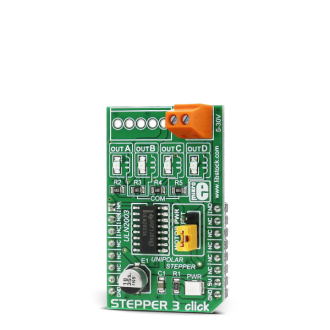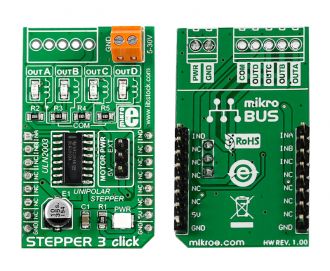
We strongly encourage users to use Package manager for sharing their code on Libstock website, because it boosts your efficiency and leaves the end user with no room for error. [more info]

Rating:
Author: MIKROE
Last Updated: 2018-06-22
Package Version: 1.0.0.1
mikroSDK Library: 1.0.0.0
Category: Stepper
Downloaded: 7570 times
Not followed.
License: MIT license
STEPPER 3 click is is a board for driving unipolar stepper motors with precise controls (individual motor phases can be accessed separately).
Do you want to subscribe in order to receive notifications regarding "Stepper 3 click" changes.
Do you want to unsubscribe in order to stop receiving notifications regarding "Stepper 3 click" changes.
Do you want to report abuse regarding "Stepper 3 click".


Library Description
The library carries everything needed for stepper motor control including speed
and acceleration setup. The library is also adjustable to working on different amounts of ticks per second, also speed and acceleration can be provided in float format. The buffer used for movement calculation is defined by the user so this library can be adjusted for MCUs with very limited RAM resources. Check the documentation for more details on how to use it.
Key functions:
uint8_t stepper3_setSpeed( float minSpeed, float maxSpeed, float accelRatio, T_STEPPER3_OBJ obj ) - Function for setting the motor speed.uint8_t stepper3_setRoute( const uint8_t direction, uint32_t steps, T_STEPPER3_OBJ obj ) - Setup new route.void stepper3_start( T_STEPPER3_OBJ obj ) - Start motor movement.Examples Description
The application is composed of three sections:
void applicationTask()
{
stepper3_start( (T_STEPPER3_OBJ)&myStepper );
while ( myStepper.status.running )
{
stepper3_process( (T_STEPPER3_OBJ)&myStepper );
}
Delay_ms( 2000 );
}
In addition to the library function calls example carries the necessary Timer ISR and Timer initialization. Check the Timer initialization settings and update it according to your MCU - Timer Calculator.
Additional notes and information
Depending on the development board you are using, you may need USB UART click, USB UART 2 click or RS232 click to connect to your PC, for development systems with no UART to USB interface available on the board. The terminal available in all MikroElektronika compilers, or any other terminal application of your choice, can be used to read the message.